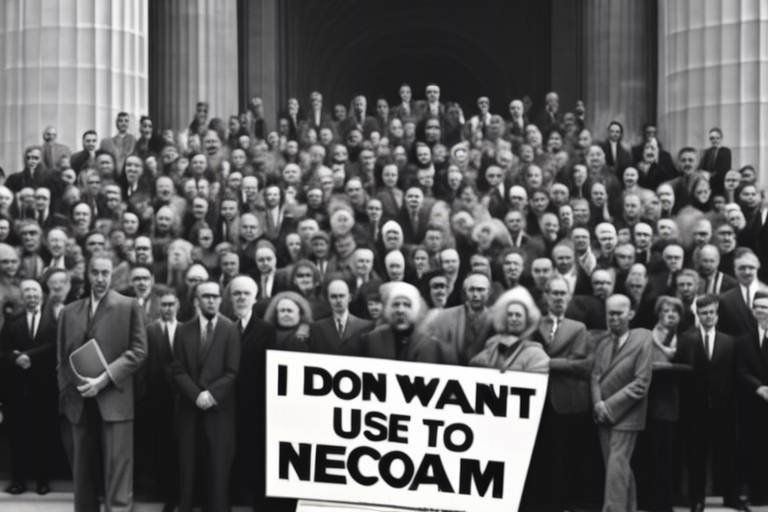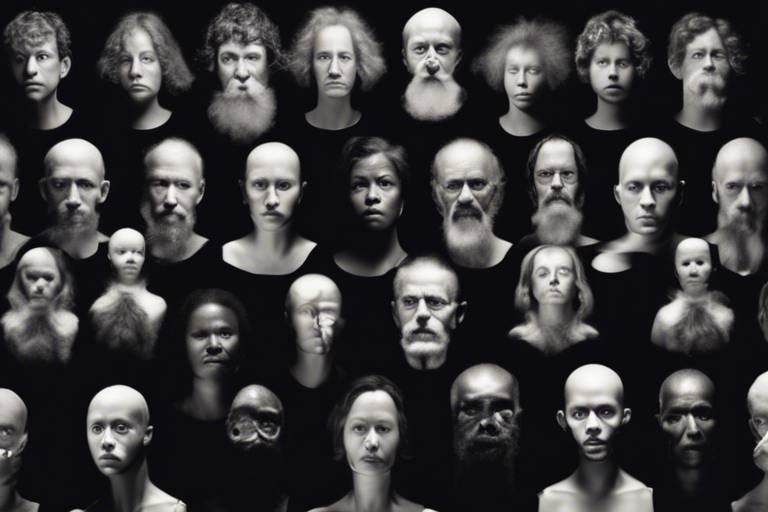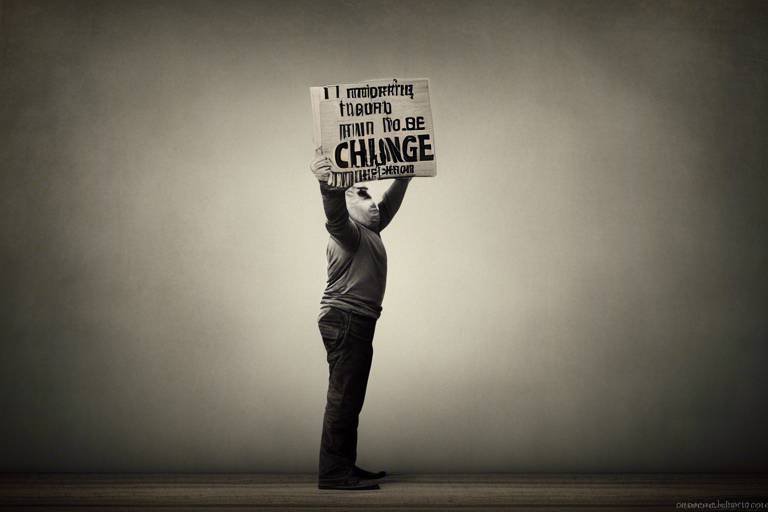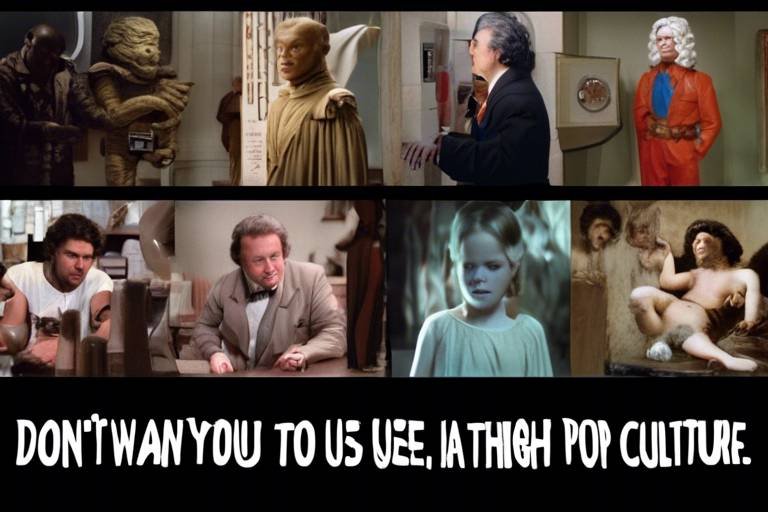Why are Philosophical Debates Crucial?
Philosophical debates are not just idle chatter; they are the lifeblood of intellectual exploration and personal growth. Think about it: when was the last time you really challenged your beliefs? These debates serve as a vibrant arena where ideas clash, evolve, and ultimately enrich our understanding of the world. They allow us to dive deep into the **fundamental questions** of existence, ethics, and society, often leading to profound insights that can transform our perspectives.
Imagine standing on the edge of a vast ocean of knowledge, with philosophical debates acting as your surfboard, helping you navigate the waves of thought. Each discussion is like a wave, bringing new ideas and perspectives that can either lift you higher or knock you down. But that's the beauty of it! Engaging in these debates encourages us to articulate our thoughts clearly and challenge our own beliefs, fostering a sense of curiosity and a desire for deeper understanding.
Moreover, philosophical debates are crucial because they cultivate **critical thinking skills**. In a world overflowing with information, the ability to analyze arguments and identify logical fallacies is more important than ever. When we participate in these discussions, we learn to dissect complex ideas, weigh evidence, and arrive at informed conclusions. This process not only sharpens our intellect but also equips us to make better decisions in our daily lives.
Throughout history, philosophical debates have been the catalyst for major societal changes. From the ancient Greeks to the Enlightenment thinkers, these discussions have shaped the trajectory of human thought. They have led to the rise of various philosophical schools that continue to influence contemporary discussions. The evolution of these debates has given birth to modern philosophical movements that challenge traditional views, encouraging us to think outside the box and embrace new ideas.
In essence, philosophical debates are more than just conversations; they are a vital part of our social fabric. They create **safe spaces** for individuals to express their thoughts freely, fostering an environment of vulnerability and honesty. This openness is essential for productive and meaningful conversations, allowing us to connect with others on a deeper level.
So, why are philosophical debates crucial? They are essential for personal growth, critical thinking, and societal progress. They help us navigate the complexities of life, challenge our assumptions, and build a sense of community based on shared intellectual curiosity. In a world that often feels divided, engaging in philosophical debates can be a bridge that connects us, fostering mutual understanding and respect among individuals with differing beliefs and values.
- What is the purpose of philosophical debates? Philosophical debates aim to explore complex ideas, challenge beliefs, and foster critical thinking.
- How do philosophical debates enhance critical thinking? They encourage participants to analyze arguments, identify logical fallacies, and develop well-reasoned conclusions.
- Who are some influential philosophers? Notable philosophers include Socrates, Plato, and Kant, whose ideas continue to shape modern thought.
- Why is open dialogue important? Open dialogue promotes understanding and respect among individuals with differing beliefs, enriching the conversation.

Understanding Philosophical Debates
Philosophical debates are more than just discussions; they are a dynamic exchange of ideas that challenge our perceptions and beliefs. Imagine sitting around a table with friends, each person bringing their unique perspectives to the conversation. This is the essence of philosophical debates—an opportunity to explore complex ideas and concepts that often shape our understanding of the world. They provide a platform for individuals to articulate their thoughts, question established norms, and engage in a dialogue that encourages personal growth.
At the heart of these debates lies the fundamental question: What does it mean to think critically? Engaging in philosophical discussions compels us to examine our own beliefs and the beliefs of others. It’s like holding a mirror up to our thoughts, allowing us to see the intricacies of our reasoning. When we debate, we are not just voicing opinions; we are constructing arguments, analyzing evidence, and dissecting the logic behind our assertions. This process is crucial for fostering a deeper understanding of both ourselves and the world around us.
Moreover, philosophical debates often delve into profound topics such as existence, ethics, and societal norms. They encourage us to ask questions like:
- What is the nature of reality?
- Is there a universal moral code?
- What role do we play in shaping society?
These questions may seem daunting, but they are essential for intellectual growth. By grappling with such inquiries, we not only expand our knowledge but also enhance our ability to empathize with differing viewpoints. This is where the true value of philosophical debates shines—by promoting an atmosphere of open-mindedness and respect.
Furthermore, engaging in these discussions can lead to unexpected insights. Just as a sculptor chisels away at a block of marble to reveal a masterpiece, philosophical debates can help us uncover deeper truths about ourselves and our beliefs. They challenge us to step outside our comfort zones and confront ideas that may initially seem foreign or uncomfortable. This process of exploration is vital, as it leads to a more nuanced understanding of complex issues.
In essence, understanding philosophical debates is about recognizing their role as a catalyst for change. They are not merely academic exercises; they are vital conversations that shape our thoughts and actions. By engaging in these debates, we become more informed citizens, better equipped to navigate the complexities of modern life. So, the next time you find yourself in a discussion about a philosophical topic, remember that you are participating in a long-standing tradition of inquiry that has the power to transform not only your own perspective but also the world around you.

The Role of Critical Thinking
Critical thinking is more than just a buzzword; it’s the backbone of effective philosophical debates. When individuals engage in these discussions, they are not merely exchanging opinions; they are honing their ability to analyze, evaluate, and synthesize information. Imagine walking into a debate armed with a toolbox full of analytical skills—each tool representing a different aspect of critical thinking. This empowers participants to dissect arguments, spot logical fallacies, and construct well-reasoned conclusions. The process is akin to a mental workout, where the more you practice, the sharper your skills become.
Engaging in philosophical debates enhances critical thinking in several ways. Firstly, it encourages participants to question their assumptions and beliefs. Have you ever held a conviction so deeply that you never thought to challenge it? Philosophical discussions compel you to confront these beliefs and examine them under a microscope. This self-reflection is crucial for personal growth and intellectual development.
Moreover, critical thinking allows individuals to navigate the complexities of different arguments. In a world rife with misinformation and conflicting perspectives, the ability to discern credible sources and evaluate the strength of various viewpoints is invaluable. Consider this: in a debate about ethics, one participant might argue for utilitarianism while another champions deontological ethics. Without critical thinking, it would be easy to get lost in the sea of ideas. However, with these skills, participants can weigh the merits of each perspective and arrive at a more nuanced understanding.
Additionally, engaging in philosophical debates fosters a culture of inquiry. It’s not just about winning an argument; it’s about exploring ideas collaboratively. When participants feel safe to express their thoughts, they often find themselves asking deeper questions, such as:
- What is the basis for my beliefs?
- Are my arguments logically sound?
- How do my values influence my perspective?
This inquiry leads to richer discussions and encourages a mindset that values learning over simply being right. In essence, critical thinking transforms debates from mere verbal sparring matches into profound journeys of discovery.
As we delve deeper into the historical context of philosophical debates, we see how critical thinking has evolved over time. From Socratic dialogues that emphasized questioning to modern discussions that incorporate diverse viewpoints, the role of critical thinking remains central. It’s a reminder that the quest for knowledge is ongoing and that every debate is an opportunity to grow.
Ultimately, the role of critical thinking in philosophical debates cannot be overstated. It equips individuals with the tools necessary to navigate complex ideas, fosters a culture of inquiry, and promotes personal and intellectual growth. By engaging in these debates, we not only sharpen our minds but also contribute to a more informed and thoughtful society.

Historical Context
Philosophical debates have a rich and vibrant history that stretches back to the dawn of human civilization. These discussions have served as a crucible for ideas, shaping not only individual thought but also the very fabric of society. From the ancient Greeks to modern-day thinkers, philosophical debates have been pivotal in challenging the status quo and igniting change.
In ancient Greece, philosophers like Socrates and Plato laid the groundwork for what we now consider philosophical discourse. Socrates famously engaged in dialogues that questioned the very essence of virtue, knowledge, and justice. His method of questioning—known as the Socratic method—encouraged individuals to think deeply about their beliefs, leading to a greater understanding of themselves and the world around them.
Fast forward to the Enlightenment period, where thinkers such as Immanuel Kant and John Locke propelled philosophical debates into new territories. Kant's ideas on ethics and autonomy challenged traditional notions of morality, while Locke's theories on government and individual rights laid the foundation for modern democracy. These debates were not just academic; they had tangible effects on society, influencing revolutions and reforms across the globe.
Throughout history, philosophical debates have addressed pressing societal issues, such as:
- The nature of justice and equality
- The role of government and authority
- The ethics of war and peace
- The implications of scientific advancements
These discussions have often mirrored the cultural and political climates of their times, reflecting humanity's ongoing struggle to understand itself and its place in the universe. The evolution of philosophical thought has not only enriched our understanding of various concepts but also fostered a spirit of inquiry that remains essential today.
As we examine the historical context of philosophical debates, it becomes evident that they are not merely academic exercises but vital dialogues that have the power to shape our world. Each era, with its unique challenges and triumphs, has contributed to the rich tapestry of philosophical thought, encouraging us to continue questioning, debating, and evolving.
- What is the purpose of philosophical debates?
Philosophical debates aim to explore complex ideas, challenge existing beliefs, and foster critical thinking, ultimately leading to a deeper understanding of various concepts. - How do philosophical debates influence society?
These debates have historically influenced major societal changes, encouraging reform and the development of new ideas that shape culture and governance. - Can anyone participate in philosophical debates?
Absolutely! Philosophical debates are open to everyone, regardless of background or expertise. They encourage diverse perspectives and promote mutual understanding.

Influence on Modern Philosophy
The evolution of philosophical debates has had a profound impact on modern philosophy, shaping the way we think about ethics, knowledge, and reality. As we delve into the intricate tapestry of philosophical thought, we can see how the ideas of past philosophers have paved the way for contemporary discussions. For instance, the rigorous questioning methods of Socrates have inspired countless thinkers to pursue truth through dialogue and critical inquiry. This method of questioning not only challenges prevailing norms but also encourages individuals to examine their own beliefs critically.
Moreover, the contributions of Immanuel Kant have revolutionized our understanding of morality and autonomy. Kant's categorical imperative urges us to consider the universality of our actions, prompting us to ask ourselves whether we would want our actions to become a universal law. This has led to modern ethical theories that emphasize the importance of intention and the moral responsibility of individuals in society. As a result, Kant's influence can be seen in various fields, including law, politics, and personal ethics, where the implications of our choices are scrutinized more closely.
In addition to these historical figures, modern philosophical movements such as existentialism and postmodernism have emerged from the rich soil of philosophical debate. Existentialists like Jean-Paul Sartre and Simone de Beauvoir challenge us to confront the absurdity of existence and embrace our freedom to create meaning in a seemingly indifferent universe. On the other hand, postmodern thinkers question the very foundations of knowledge and truth, suggesting that our understanding is shaped by cultural and social contexts rather than objective realities. This shift has led to a more pluralistic view of philosophy, where multiple perspectives are not only acknowledged but celebrated.
As we explore these modern movements, it becomes evident that philosophical debates serve as a catalyst for innovation in thought. They encourage us to break free from dogmatic beliefs and embrace a more nuanced understanding of complex issues. This is particularly relevant in today's world, where we face global challenges that require collaborative and interdisciplinary approaches. The philosophical debates of the past continue to resonate, reminding us that the quest for knowledge and understanding is an ongoing journey, one that is enriched by the diversity of thought.
In summary, the influence of historical philosophical debates on modern philosophy is undeniable. The ideas and methodologies developed by philosophers like Socrates and Kant have not only shaped our understanding of ethics and knowledge but have also inspired new movements that challenge conventional wisdom. As we continue to engage in philosophical discussions, we honor the legacy of these thinkers and contribute to the ever-evolving landscape of human thought.
- What is the importance of philosophical debates? Philosophical debates are crucial as they encourage critical thinking, challenge existing beliefs, and foster a deeper understanding of complex issues.
- How do philosophical debates influence modern society? They help shape ethical frameworks, promote open dialogue, and encourage diverse perspectives, which are essential for a functioning democracy.
- Can anyone participate in philosophical debates? Absolutely! Philosophical debates are open to everyone, regardless of their background or expertise, as they are about exploring ideas and perspectives.
- What skills can one gain from engaging in philosophical debates? Participants can develop critical thinking, articulate their thoughts clearly, and learn to analyze arguments effectively.

Philosophers Who Shaped Thought
Throughout history, certain philosophers have emerged as titans of thought, wielding their ideas like a sculptor shaping marble. These thinkers didn't just ponder the universe; they fundamentally altered the way we engage with it. Let's dive into the minds of a few of these intellectual giants and explore how their contributions continue to resonate in our lives today.
One of the most significant figures is Socrates, often referred to as the father of Western philosophy. He introduced the practice of questioning, famously known as the Socratic Method, which encourages deep inquiry and dialogue. Rather than providing answers, Socrates challenged his followers to think critically and examine their beliefs. Imagine sitting in a bustling Athenian marketplace, and instead of simply accepting what you hear, you start to question everything around you. This method not only fostered a culture of critical thinking but also laid the groundwork for future philosophical discourse.
Following in Socrates' footsteps, Plato, his student, expanded on these ideas by establishing the Academy in Athens, the first institution of higher learning in the Western world. Plato’s dialogues often featured Socratic questioning and explored profound themes such as justice, beauty, and equality. His allegory of the cave, where prisoners mistake shadows for reality, serves as a metaphor for human ignorance and enlightenment. It’s a powerful reminder that what we perceive may not be the whole truth, pushing us to seek deeper understanding.
Then we have Immanuel Kant, who revolutionized philosophy in the 18th century with his ideas on knowledge and ethics. Kant argued that our understanding of the world is shaped by our experiences and perceptions, coining the term "categorical imperative," which suggests that one should act only according to that maxim whereby you can at the same time will that it should become a universal law. This idea prompts us to consider the broader implications of our actions, encouraging a sense of moral responsibility that is still relevant today.
These philosophers, among many others, have created a rich tapestry of thought that encourages us to question, explore, and understand the complexities of our existence. They remind us that philosophical debates are not just academic exercises; they are essential for personal and societal growth. As we engage with their ideas, we find ourselves part of an ongoing conversation that spans centuries, challenging us to think critically and act ethically in our own lives.
In conclusion, the influence of these philosophers extends far beyond their lifetimes. Their legacies continue to inspire and provoke thought, urging us to engage in philosophical debates that are crucial for understanding ourselves and the world around us. By examining their contributions, we not only honor their work but also enrich our own intellectual journeys.
- Why are philosophical debates important?
Philosophical debates encourage critical thinking, help articulate thoughts, and challenge beliefs, leading to personal growth and a deeper understanding of complex issues.
- Who are some key philosophers to study?
Some key figures include Socrates, Plato, and Kant, each contributing significantly to the development of philosophical thought.
- How can I engage in philosophical debates?
Start by exploring philosophical texts, joining discussion groups, or participating in online forums where diverse perspectives are shared.

Ethical Implications
Philosophical debates often delve into the intricate web of ethical dilemmas that define our existence. These discussions prompt us to grapple with profound questions such as: What is the right thing to do? and How do our choices impact others? When we engage in these debates, we are not merely exchanging ideas; we are exploring the very essence of morality and the principles that govern our lives. By examining various ethical frameworks, we can better understand the implications of our decisions, both personally and socially.
For instance, consider the classic dilemma of the Trolley Problem. This thought experiment forces us to confront the uncomfortable reality of making choices that affect the lives of others. Should one sacrifice a single individual to save a group of five? This scenario illustrates the tension between utilitarianism, which advocates for the greatest good for the greatest number, and deontological ethics, which emphasizes the importance of duty and moral rules. Such debates not only challenge our ethical intuitions but also provide a platform for developing a more nuanced understanding of morality.
Moreover, philosophical debates encourage us to reflect on the consequences of our actions. They push us to ask critical questions about justice, rights, and responsibilities. Are we, as individuals, accountable for the broader societal impacts of our choices? Engaging in these discussions can lead to a deeper appreciation of the interconnectedness of our actions and the ethical frameworks that guide them. As we explore various ethical theories, we can better navigate the complexities of modern life, from personal relationships to global issues such as climate change and social justice.
In today's fast-paced world, where ethical boundaries are often blurred, philosophical debates serve as a necessary compass. They allow us to challenge the status quo and question the moral implications of contemporary issues. For example, debates surrounding artificial intelligence and genetic engineering raise critical ethical questions about consent, autonomy, and the potential consequences of our technological advancements. By engaging in these discussions, we can foster a more informed and conscientious society.
Ultimately, the ethical implications of philosophical debates extend beyond mere intellectual exercise. They invite us to consider our values and the principles we hold dear. By participating in these discussions, we not only sharpen our reasoning skills but also cultivate a deeper understanding of what it means to be human. In a world rife with moral ambiguity, philosophical debates provide a vital space for reflection, dialogue, and growth.
- What are philosophical debates? Philosophical debates are discussions that explore fundamental questions about existence, ethics, and society, allowing individuals to articulate their thoughts and challenge their beliefs.
- Why are ethical implications important in philosophical debates? Ethical implications are crucial as they help us understand the moral dimensions of our choices and their consequences on society and individuals.
- How do philosophical debates enhance critical thinking? They encourage participants to analyze arguments, identify logical fallacies, and develop well-reasoned conclusions, which are essential for informed decision-making.
- Can philosophical debates create a sense of community? Yes, they foster connections among participants based on shared interests and intellectual curiosity, enriching the social fabric of society.

Encouraging Open Dialogue
In our rapidly changing world, the ability to engage in open dialogue has never been more crucial. Philosophical debates create a vibrant space where individuals can voice their opinions, challenge assumptions, and explore complex ideas without fear of judgment. Imagine a lively café where people gather not just to sip coffee, but to dissect the very fabric of reality and ethics. This is the essence of philosophical discourse—an environment that thrives on curiosity and respect.
When we engage in philosophical debates, we invite a tapestry of diverse perspectives to enrich our understanding. Each individual brings their unique background, experiences, and beliefs to the table, creating a rich dialogue that can illuminate blind spots in our thinking. This is not just about winning an argument; it's an opportunity to broaden our horizons and see the world through a different lens. Have you ever found yourself surprised by someone else's viewpoint? That moment of realization can be transformative, prompting us to rethink long-held beliefs.
Moreover, encouraging open dialogue fosters an atmosphere of mutual respect. When participants feel safe to express their thoughts, it paves the way for deeper connections and understanding. This is particularly important in a society where polarization can lead to misunderstandings and conflict. By sharing ideas in a respectful manner, we can bridge gaps between differing beliefs and values. The goal is not to convince others to adopt our views but to create a space where everyone feels heard and valued.
Establishing these safe spaces for discussion is vital. They allow participants to express their thoughts freely, encouraging vulnerability and honesty. For instance, consider a classroom setting where students are encouraged to share their thoughts on ethical dilemmas. By discussing topics like justice, freedom, and responsibility, students can explore the nuances of these concepts in a supportive environment. This not only enhances their understanding but also cultivates a culture of respect and empathy.
Furthermore, philosophical debates can significantly contribute to building community. When individuals come together to explore ideas, they create connections based on shared interests and intellectual curiosity. These connections can lead to lasting friendships and collaborative efforts that extend beyond the debate itself. In this way, philosophical discussions become a vital part of the social fabric, enriching our communities and fostering a sense of belonging.
In conclusion, encouraging open dialogue through philosophical debates is essential for personal growth, community building, and the promotion of a more understanding society. By creating environments where diverse ideas can flourish and be respected, we not only enhance our own understanding but also contribute to a more cohesive and empathetic world.
- What is the purpose of philosophical debates? Philosophical debates aim to explore complex ideas, encourage critical thinking, and foster understanding among individuals with differing perspectives.
- How can open dialogue improve society? Open dialogue allows for the sharing of diverse viewpoints, which can lead to mutual respect, understanding, and community building.
- What are safe spaces in discussions? Safe spaces are environments where individuals can express their thoughts freely without fear of judgment, promoting honesty and vulnerability.
- Can philosophical debates lead to personal growth? Yes, engaging in philosophical debates challenges individuals to rethink their beliefs and expand their understanding, fostering personal development.

Creating Safe Spaces
In a world where opinions can clash like thunder, creating safe spaces for philosophical debates is essential. Imagine a cozy café where ideas flow as freely as the coffee, allowing participants to express their thoughts without fear of judgment. This environment fosters vulnerability and honesty, which are critical for meaningful discussions. When individuals feel safe, they are more likely to open up about their beliefs, share personal experiences, and engage in deep, reflective conversations.
Establishing these spaces isn't just about physical comfort; it's about cultivating an atmosphere of respect and understanding. Ground rules can be set to promote active listening and discourage interruptions, ensuring that everyone has a chance to voice their opinions. For instance, participants might agree to:
- Listen actively without interrupting.
- Respect differing viewpoints, even if they disagree.
- Avoid personal attacks and focus on ideas instead.
By implementing such guidelines, we create an ecosystem where ideas can be challenged constructively, rather than destructively. Think of it as a garden where diverse plants can grow; each one unique, yet contributing to the beauty of the whole. In these safe spaces, participants can explore complex philosophical questions together, encouraging growth not just in knowledge, but in empathy and understanding.
Moreover, safe spaces can help bridge the gap between differing backgrounds and experiences. When individuals come together from various walks of life, it enriches the dialogue and allows for a more comprehensive exploration of ideas. This diversity can lead to unexpected insights and foster a deeper appreciation for the complexities of human thought. Ultimately, creating safe spaces for philosophical debates isn't just about comfort; it's about building community and nurturing a culture of open dialogue, where every voice matters.
Q: What is a safe space in the context of philosophical debates?
A: A safe space is an environment where individuals can discuss their ideas and beliefs without fear of judgment or hostility, fostering open and respectful dialogue.
Q: How can I contribute to creating a safe space?
A: You can contribute by actively listening, respecting differing opinions, and following established ground rules during discussions.
Q: Why are safe spaces important for philosophical debates?
A: They encourage vulnerability and honesty, allowing for deeper exploration of complex ideas and fostering a sense of community among participants.

Building Community
Philosophical debates aren't just about exchanging ideas; they are a powerful catalyst for community building. When individuals come together to discuss complex topics, they create a space where intellectual curiosity thrives. Imagine a group of people sitting around a table, each with a unique perspective to share. This dynamic interaction fosters connections that can transform strangers into friends. In a world that often feels divided, philosophical debates provide a much-needed opportunity for individuals to bond over shared inquiries and mutual respect.
One of the most remarkable aspects of these discussions is how they can lead to a sense of belonging. Participants often find common ground in their quest for understanding, which can be incredibly comforting. When you engage in a philosophical debate, you are not just voicing your opinion; you are joining a larger conversation that has been ongoing for centuries. This realization can make individuals feel like they are part of something bigger than themselves, a community of thinkers striving for truth.
Moreover, engaging in philosophical discussions allows participants to explore diverse viewpoints. This exposure to different ideas can be enlightening and can challenge preconceived notions. When we listen to others' perspectives, we often find ourselves re-evaluating our beliefs, which deepens our understanding of the subject matter. In this way, philosophical debates serve as a bridge between differing ideologies, promoting empathy and respect among participants.
To enhance the sense of community within philosophical debates, it can be beneficial to establish ground rules that encourage respectful dialogue. Here are some key principles that can help create a positive environment:
- Active Listening: Encourage participants to listen attentively to others without interrupting.
- Respectful Disagreement: Remind everyone that it’s okay to disagree, but it must be done respectfully.
- Open-Mindedness: Foster an atmosphere where individuals are willing to consider new ideas and perspectives.
- Confidentiality: Ensure that personal stories shared in the group remain confidential, promoting trust among participants.
By implementing these principles, participants can feel safe to express their thoughts and vulnerabilities. This openness is essential for meaningful conversations and helps build a stronger community. Over time, these gatherings can evolve into lasting friendships and networks of support, where individuals not only challenge each other intellectually but also provide emotional and social backing.
Ultimately, philosophical debates are more than just discussions; they are a means of creating a vibrant community. They invite individuals to connect, share, and grow together. In a society that often prioritizes individualism, these debates remind us of the value of collaboration and shared inquiry. So, the next time you find yourself in a philosophical discussion, remember: you’re not just debating ideas; you’re building a community.
- What is the main purpose of philosophical debates?
The main purpose is to explore complex ideas, challenge beliefs, and foster critical thinking among participants.
- How can I participate in a philosophical debate?
You can join local discussion groups, online forums, or even start your own debate with friends or family.
- Are philosophical debates only for scholars?
No, anyone with an interest in discussing ideas can participate, regardless of their background.
- What are some benefits of engaging in philosophical debates?
Benefits include improved critical thinking skills, enhanced understanding of different perspectives, and the development of a supportive community.
Frequently Asked Questions
- What are philosophical debates?
Philosophical debates are discussions that explore complex ideas and fundamental questions about existence, ethics, and society. They provide a platform for individuals to articulate their thoughts, challenge their beliefs, and engage in critical thinking.
- Why are philosophical debates important?
These debates are crucial for personal growth and understanding. They enhance critical thinking skills, allowing participants to analyze arguments and develop well-reasoned conclusions. This process contributes to informed decision-making in everyday life.
- How do philosophical debates influence modern thought?
Philosophical debates have historically shaped societal changes and the development of various schools of thought. They continue to influence modern philosophy by challenging traditional views and introducing new perspectives on ethics, knowledge, and reality.
- Who are some notable philosophers involved in debates?
Philosophers like Socrates, Plato, and Kant have significantly contributed to the landscape of philosophical debates. Their ideas and legacies continue to inspire new generations of thinkers and shape contemporary discussions.
- What ethical dilemmas do philosophical debates address?
Philosophical debates often tackle ethical dilemmas, prompting individuals to reflect on moral principles and the consequences of their actions. This exploration helps foster a deeper understanding of right and wrong within society.
- How do philosophical debates promote open dialogue?
These debates encourage open dialogue by allowing diverse perspectives to be shared. This exchange can lead to mutual understanding and respect among individuals with differing beliefs and values, enriching the conversation.
- What is the significance of creating safe spaces for debates?
Establishing safe spaces for philosophical discussions is essential as it allows participants to express their thoughts freely. This environment encourages vulnerability and honesty, which are crucial for productive and meaningful conversations.
- Can philosophical debates build community?
Absolutely! Philosophical debates can foster a sense of community among participants. They create connections based on shared interests and intellectual curiosity, ultimately enriching the social fabric of society.



















